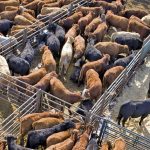An insight into Japan’s tough stance against Canadian cattle and beef imports was provided last week by Mindy Kotler, a Washington, D.C.-based Japan analyst.
She wrote in the Globe and Mail that Japan’s Liberal Democratic Party is in a fragile ruling coalition and wants to regain its majority status in parliamentary elections that must be held in the next 12 months.
Its popularity was severely bruised by its mishandling of a domestic outbreak of bovine spongiform encephalopathy in 2001.
Its bungling shook the confidence of urban voters, scaring them away from beef. This damaged the livelihood of many rural voters, who are traditional LDP supporters.
Read Also

VIDEO: Catch up with the Western Producer Markets Desk
The Western Producer Markets Desk provides daily updates on agricultural markets, with recent video commentary including looks into canola, wheat, cattle and feed grains.
To win back consumer confidence, the LDP is now implementing extreme safeguards in its domestic beef supply.
To win back rural voters it is limiting beef imports by taking advantage of a provision allowed under World Trade Organization rules allowing countries to prevent sudden import surges by raising tariffs.
This year, beef imports are up more than 17 percent and so Japan is increasing its beef tariff to 50 percent from 38.5 percent Aug. 1.
Critics argue the surge was apparent only because imports plunged last year because of the BSE scare and are only now slowly recovering to pre BSE levels.
Australia’s prime minister noted his country’s deep displeasure about the tariff increase with his Japanese counterpart last week, but to no avail.
The tariff will hit supplies from Australia and the United States.
Canada’s BSE case already provided Japan an unexpected excuse to keep Canadian beef out of its market and now the demand that American beef be certified Canadian-free is another tool.
Kotler believes Washington is using kid gloves with Japan because the Liberal Democrats pushed to support the U.S. in Iraq and Afghanistan and change Japan pacifist security policy to support U.S. operations abroad.
But if this dalliance Washington has with Japan’s BSE demands continues, it is likely to hurt American beef producers eventually.
America’s continued BSE-free status is a matter of luck. Canadian and American rules to protect against the disease were the same and had the same level of enforcement. If BSE turned up in Canada, there is a good chance it will eventually appear in the U.S.
And if it does, American farmers will wish Washington had had a consistent strong policy against the non scientific, politically motivated demands of Japan.














